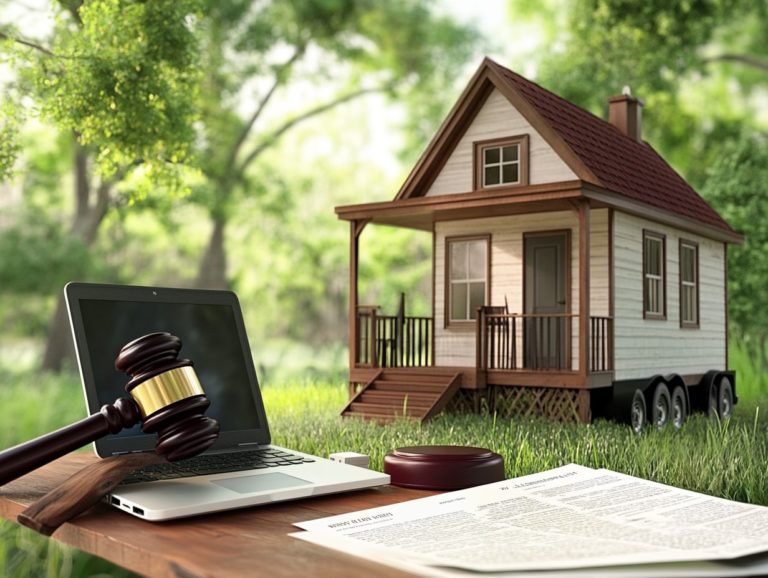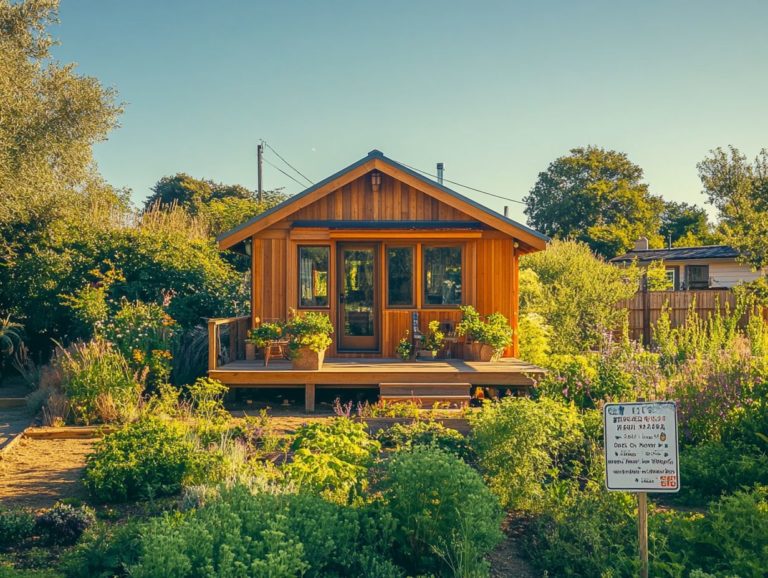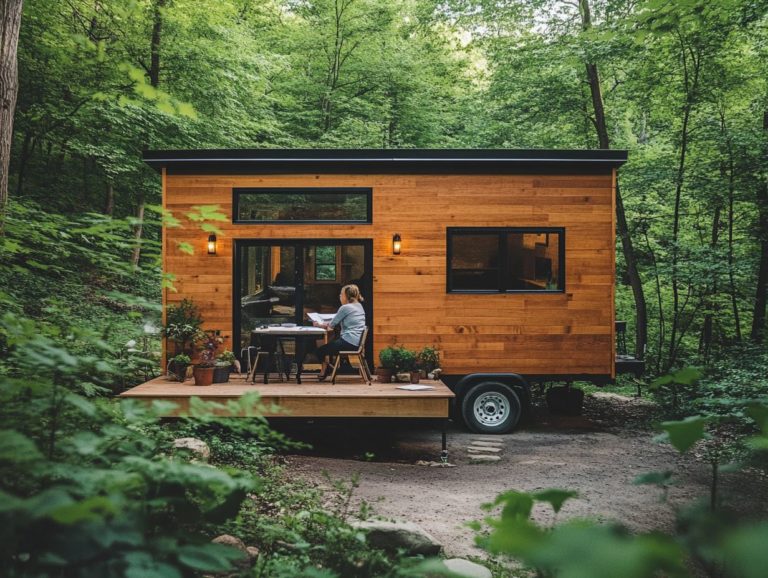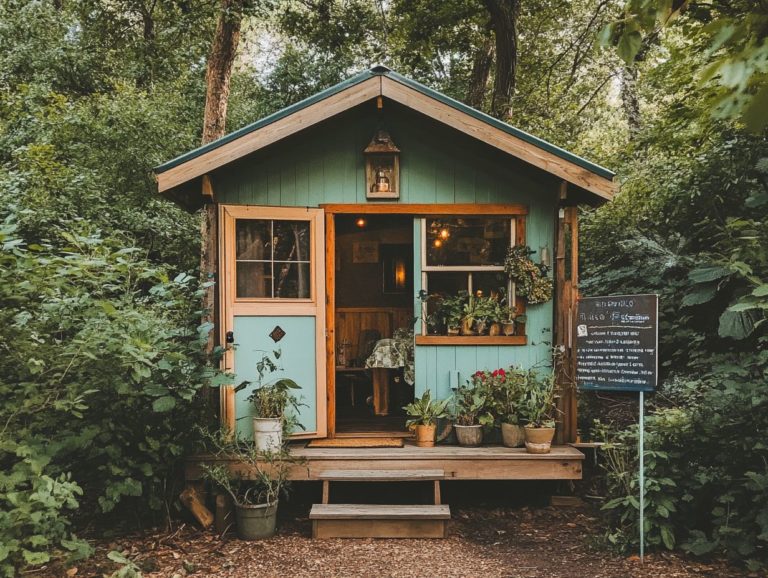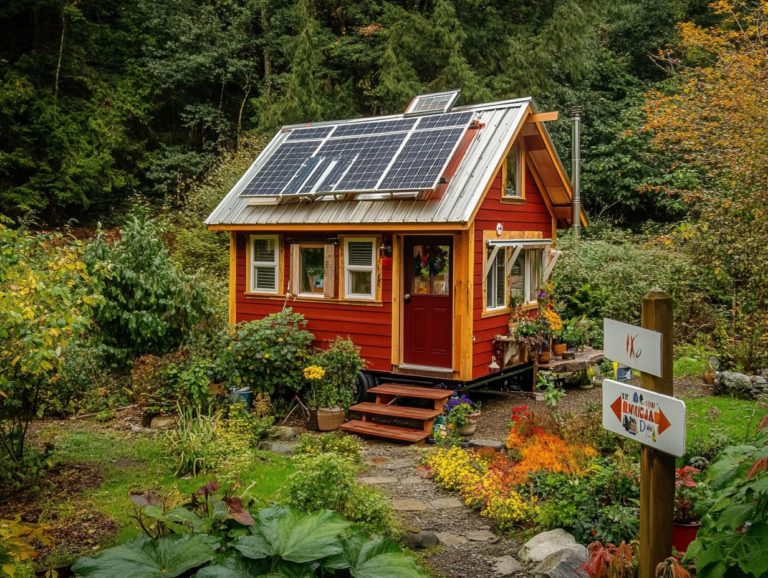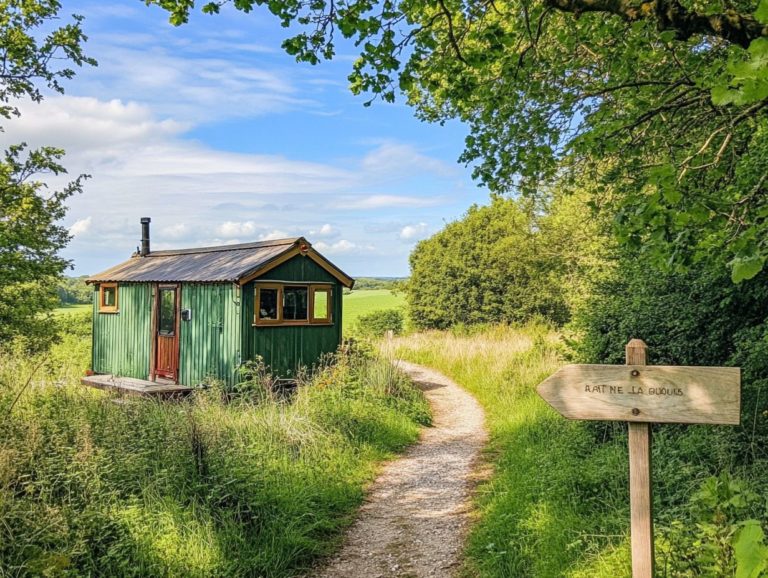Legal Advice for Tiny House Enthusiasts
Tiny houses are not merely a passing trend; they embody a lifestyle choice that champions simplicity and sustainability.
Navigating the legal landscape surrounding tiny homes can feel daunting. From understanding the laws about tiny houses to considering insurance and property taxes, it’s essential for tiny house enthusiasts like you to stay well-informed.
This article delves into crucial legal considerations, guiding you through options for ownership and helping you determine whether buying or building aligns with your vision. You’ll also find tips for finding the right land or community.
Dive into the exciting world of tiny house living and make empowered choices!
Contents [hide]
- Key Takeaways:
- Understanding Tiny Houses and the Law
- Zoning and Building Codes for Tiny Houses
- Legal Considerations for Living in a Tiny House
- Legal Options for Tiny House Living
- Frequently Asked Questions
- What is the legal definition of a tiny house?
- Do I need a building permit to build a tiny house?
- Can I live in a tiny house on any piece of land?
- What are the potential legal challenges of living in a tiny house?
- Do I need a lawyer to help me with legal issues related to my tiny house?
- Are there any legal resources specifically for tiny house enthusiasts?
Key Takeaways:
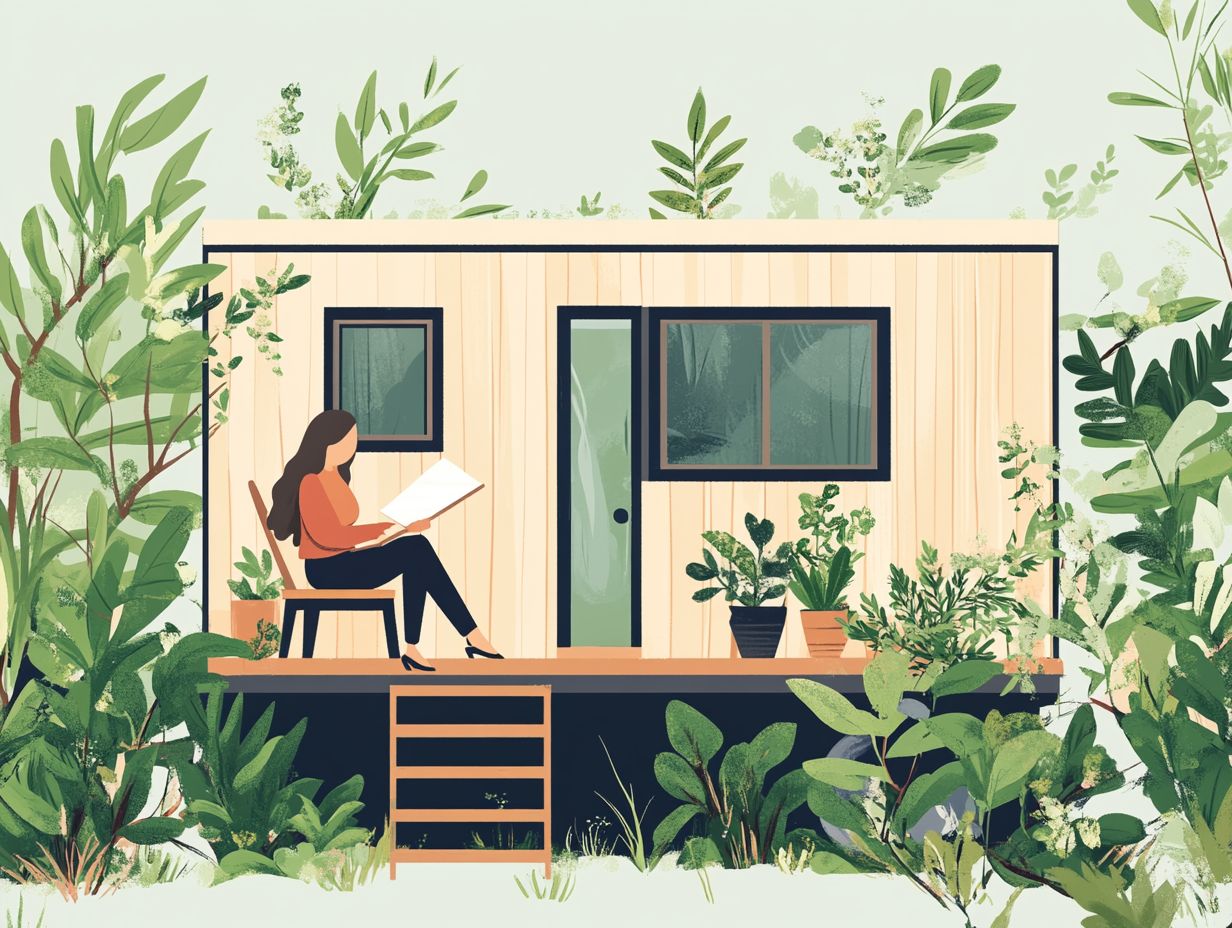
- Be aware of local laws, as they can affect where you place your tiny house.
- Consider insurance, liability, and property taxes when living in a tiny house. These legal considerations may differ from traditional home ownership.
- Explore options for tiny house living, such as buying or building a tiny house and leasing land or joining a community. Each option has its own legal implications, so it’s important to understand them before making a decision.
Understanding Tiny Houses and the Law
Grasping the legal landscape surrounding tiny houses is vital for anyone drawn to the tiny house movement. Zoning laws and building codes can significantly influence your ability to construct these compact dwellings.
While the American Tiny House Association offers valuable resources, navigating local regulations can present its own challenges. In many communities, the legality of portable tiny homes and those on wheels is still a work in progress.
Staying informed about current trends and shifts in zoning regulations is essential for ensuring compliance and nurturing a vibrant tiny house community.
Defining Tiny Houses and Their Legality
Tiny houses, typically defined as residential structures under 400 square feet, can introduce a host of legal challenges related to zoning and building codes.
As these compact living spaces gain traction as a remedy for escalating housing costs and environmental concerns, they present a unique opportunity for you to downsize and simplify your lifestyle. However, the differences between tiny homes on wheels classified as recreational vehicles and traditional tiny homes on permanent foundations can muddy the waters even further.
While the Federal Housing Administration has established guidelines that touch on these residences, regulations can vary dramatically from state to state. This means that, as a potential owner, you’ll need to skillfully navigate the complex landscape of local laws, ensuring your tiny dwelling adheres to zoning ordinances and obtains the necessary building permits in your area.
Zoning and Building Codes for Tiny Houses
Zoning regulations and building codes are essential elements that significantly influence the legality and feasibility of constructing tiny houses. It’s important to understand that these standards can vary widely from one jurisdiction to another, affecting your plans and possibilities.
Navigating Zoning Regulations

Navigating zoning regulations for tiny houses can feel like solving a complex puzzle, as local zoning laws can vary significantly and greatly influence your ability to establish a tiny house community.
These regulations often dictate where tiny houses can be positioned, including restrictions on accessory dwelling units (ADUs) and the use of private land for shared living arrangements. As a prospective tiny homeowner, you may face challenges such as minimum square footage requirements, prohibitions against permanent placements, and limitations on the type and size of structures allowed. It’s also important to be aware of the legal risks of building a tiny house that may affect your plans.
Understanding local ordinances is crucial for staying compliant, as these rules not only shape the feasibility of your individual project but also impact the overall success of tiny house communities. Collaborating with local planners and advocates becomes essential for effectively navigating these hurdles.
Have you considered your next steps in tiny house living? Share your thoughts or experiences below!
Meeting Building Code Requirements
To build a legal tiny house, you must navigate specific building code requirements, including standards for minimum size for homes and various structural regulations.
These guidelines ensure your tiny home is safe and lasts a long time. They also protect the well-being of everyone living in it. Compliance with the regulations set forth by the Federal Housing Administration involves adhering to minimum dwelling size and zoning laws. You must also address vital aspects such as electrical, plumbing, and fire safety standards.
Given the unique design of tiny residences, it’s crucial to consult with a tiny house specialist who understands local codes. They can offer invaluable insights and ensure that every facet of your build aligns with the necessary legal requirements. For more detailed guidance, consider navigating tiny house community regulations. This ultimately results in a secure and compliant living space.
Legal Considerations for Living in a Tiny House
When considering life in a tiny house, you need to navigate a range of legal considerations. These include insurance, liability, property taxes, and ownership rights. Each aspect can vary significantly based on your location and the type of structure you choose.
Understanding these factors will help you make informed decisions. This way, you can enjoy your tiny living experience to the fullest.
Insurance and Liability
Obtaining the right insurance coverage is essential for tiny house owners who want to shield themselves from liability claims and potential damages. This is particularly important given the unique risks associated with tiny living.
These risks often stem from the absence of traditional infrastructure and the inherent mobility of tiny homes. As a tiny house owner, you can explore various insurance options, including specialty insurance tailored specifically for smaller dwellings. This typically covers damages to the structure, personal property, and liability.
Liability coverage is especially crucial. It protects you from claims that may arise from accidents on your property, such as injuries to visitors. Keep in mind that federal housing regulations may influence the availability and terms of insurance. This can depend on whether your tiny house is on wheels or a permanent foundation.
If you own a mobile tiny home, you might find it difficult to secure standard homeowners insurance. In such cases, specialized policies can be much more advantageous. Understanding these nuances will help ensure you are adequately protected against unforeseen circumstances.
Property Taxes and Ownership
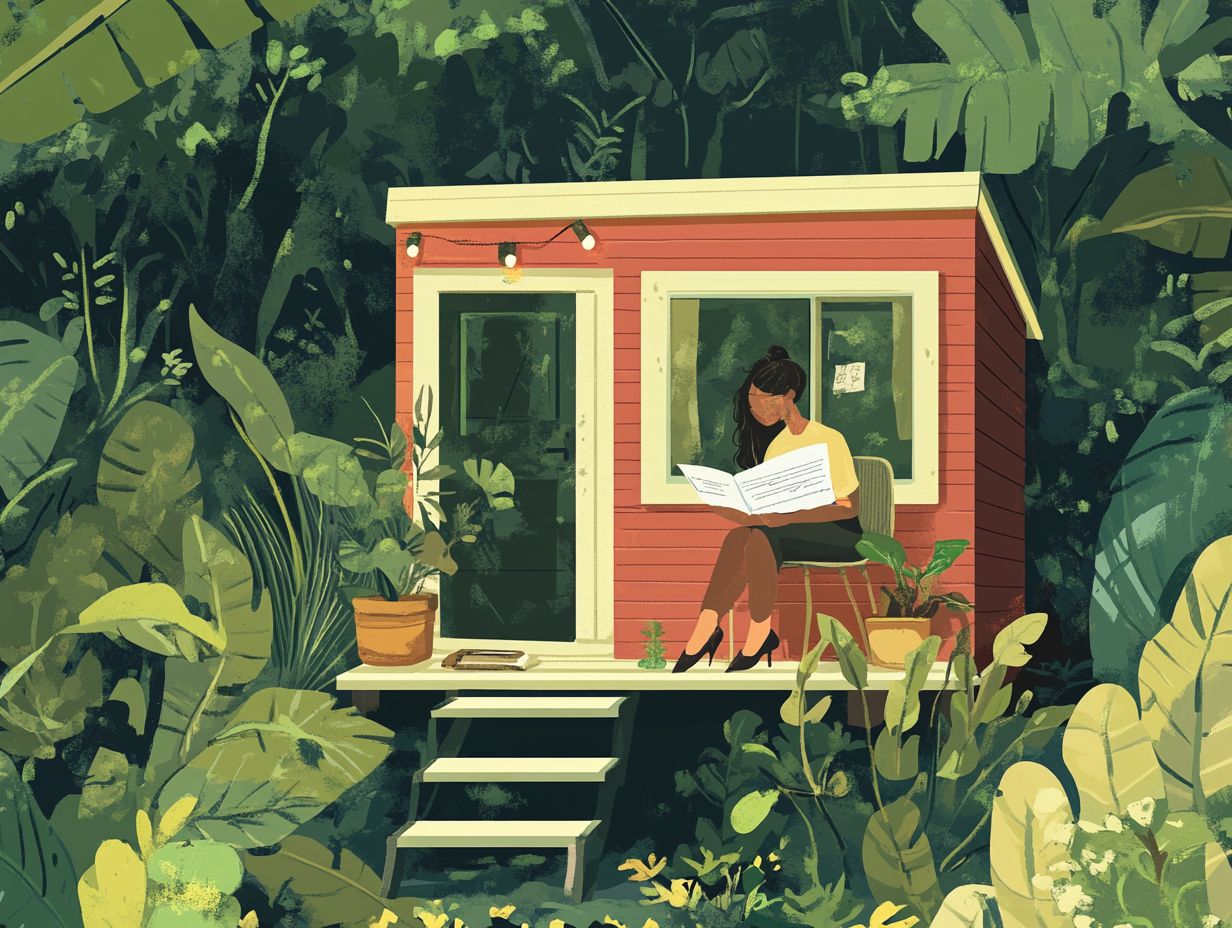
Understanding property taxes tied to tiny houses can feel like navigating a labyrinth. The classification of your tiny house whether it’s considered real estate or personal property plays a pivotal role in this. This classification determines your tax rate and shapes the financial responsibilities you may face as a tiny house owner.
If your tiny house is deemed personal property, you might enjoy significantly lower taxes, which can be quite appealing. However, if you’re renting out your tiny home, you enter a different realm of tax implications. To navigate these complexities, it’s important to explore tiny house legal resources you should know, as this can complicate matters further compared to those who live in their homes.
There are also potential deductions to consider, which can help lighten your financial load. By looking into these intricacies, you empower yourself to make informed decisions. This ultimately enhances your financial planning as a tiny house enthusiast.
Legal Options for Tiny House Living
When exploring legal options for tiny house living, you should carefully weigh the advantages of purchasing versus building your own tiny home. Consider the advantages of rental situations and the benefits associated with tiny home community memberships.
Each choice offers unique opportunities and challenges that can shape your living experience.
Buying vs. Building a Tiny House
When deciding whether to buy or build a tiny house, consider various factors such as costs and regulations. Insights from a tiny house specialist can also be invaluable.
Choosing a pre-built tiny house often allows for a quicker move-in, as these homes are usually ready for immediate use upon delivery. Constructing one from scratch provides complete customization, letting you tailor every detail to your preferences.
Understanding zoning laws and building codes is essential. Resources from the American Tiny House Association can guide you through the complexities of this growing lifestyle while ensuring you follow local regulations.
Leasing Land or Joining Communities
Leasing land for a tiny house or joining a tiny home community is a great way to embrace the tiny house lifestyle. However, be mindful of zoning regulations.
Both options offer unique benefits and challenges. For instance, leasing land gives you more flexibility in location and design, ideal for those who value autonomy.
On the other hand, tiny home communities foster camaraderie and shared resources, making it easier to connect with like-minded individuals.
Land-sharing arrangements can be a creative solution, but they require careful attention to local rules to ensure you are following the rules. Understanding both paths empowers you to make informed decisions that align with your values.
Frequently Asked Questions
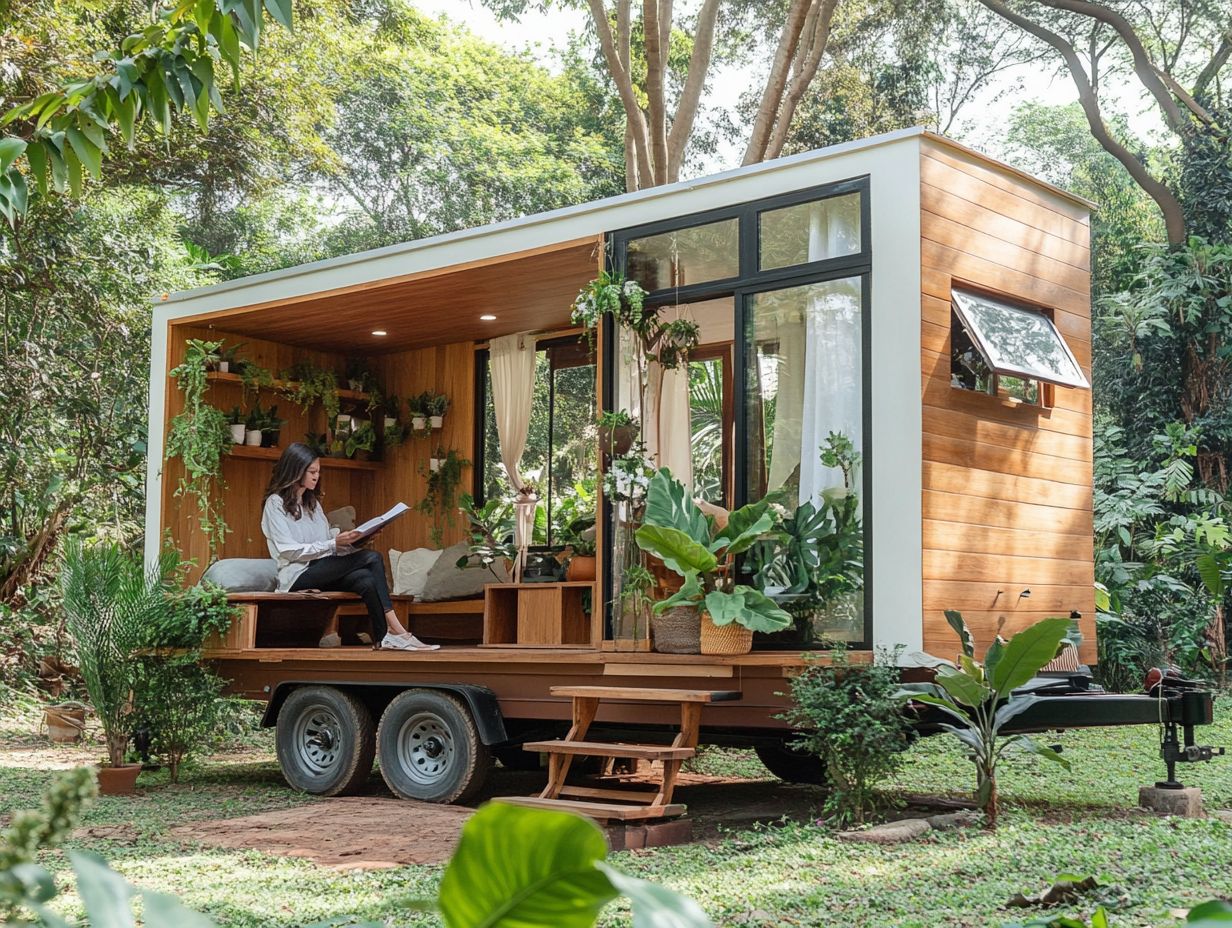
What is the legal definition of a tiny house?
The legal definition of a tiny house varies by location. Generally, it is a residential structure smaller than traditional homes, typically under 400 square feet.
Do I need a building permit to build a tiny house?
This also varies by location. In most cases, yes, you will need a building permit to construct a tiny house. It’s important to check with your local government for specific regulations.
Can I live in a tiny house on any piece of land?
Not necessarily. Zoning laws can restrict where you can park or place a tiny house. Be sure to research the zoning laws in your area before deciding on a location.
What are the potential legal challenges of living in a tiny house?
Potential legal challenges include zoning and building code violations, lack of proper utilities, and difficulties in obtaining financing or insurance.
Do I need a lawyer to help me with legal issues related to my tiny house?
While it’s not always necessary, it is highly recommended to consult with a lawyer experienced in tiny house laws. They can provide valuable guidance and help you avoid legal issues.
Are there any legal resources specifically for tiny house enthusiasts?
Yes, several organizations and websites offer legal information for tiny house enthusiasts, such as the American Tiny House Association and the Tiny House Legal Foundation. These resources can help you navigate the legal aspects of owning and living in a tiny house.

